Antiquity
 The Truceless War
The Truceless WarThe Rebellion of Carthage's Mercenaries.
Carthage had fought hard for 23 years against Rome and, exhausted, finally sued for peace in 241 BC. Sicily was surrendered to the Romans and the Punic troops stationed there, who had resisted for so long through fierce battles and exhausting sieges, were withdrawn...Middle Ages
 The Varangian Guard
The Varangian GuardThe Vikings in Byzantium.
The Varangian Guard in Byzantium is one of the very few mercenary units whose history can be counted in centuries. The length of their service and the number of battles in which they fought is perhaps only surpassed by the Swiss in the pay of the French. But while the Swiss had only to journey into neighboring France...Late Middle Ages
 The Combat of the Thirty
The Combat of the ThirtyKnightly deeds in a dirty little war.
The history of the Hundred Years War is full of ritualised duels, to which poets and chroniclers often devoted more attention and paper than the actual war. The most famous event of this kind occurred in March 1351 in Brittany, between the castle Ploërmel which had an English garrison and the nearby castle Josselin which had a Breton-French one. This was to be the scene of the legendary Combat of the Thirty. ...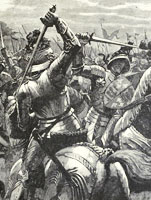 The Wars of the Roses
The Wars of the RosesAn aftermath of the Hundred Years War.
The long dynastic struggle that would much later come to be known as the "Wars of the Roses" (1455-1487) had its roots far back in the Hundred Years' War. Many historians consider the masses of defeated mercenaries returning from France to be one of the main causes of the Wars of the Roses. The unemployed veterans of the Hundred Years War were the ideal reservoir for anybody looking for experienced and ruthless fighters. ...Early Modern
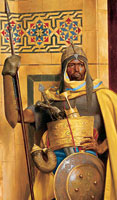 The exploits of Fuck Pasha
The exploits of Fuck PashaThe Conquest of the Songhai Empire.
Everything changed however with the introduction of new weapon technology, and on October 16, 1590, a small but well equipped army left Marrakech in the south. It consisted of 1,000 renegades, 1,000 Andalusians, 500 cavalry and 70 Christians from the prisons of the Sultan, all equipped with arquebuses. The Moroccans themselves provided only 1,500 lancers. The baggage train consisted of thousands of camels and horses,...Enlightenment and Absolutism
 Fighting the Maroons of Suriname
Fighting the Maroons of SurinameSlaves for fourpence a day.
The hunt for runaway slaves and the suppression of smaller revolts make for trivial and sordid stories. Great armies were not moved for such inconsequentialities and these events are normally relegated to footnotes by miltary historians. Nevertheless, these fights settled the fate of many mercenaries.A very vivid account of these small wars was provided by the Scottish mercenary John Gabriel Stedman.
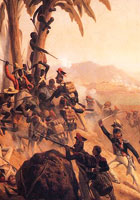 The Great Deceit
The Great DeceitThe Polish Legion in Haiti.
To gain the freedom of their own country more than 5,000 Poles formed a "Polish Legion" and fought for Napoleon. Soon the Legion proved its value in grueling battles against Austrians and Russians in Italy and Switzerland. But the real policies of those in power, as so often, served other interests and used other means. For the conflict with his most stubborn opponent, Great Britain, Napoleon needed a compromise with Russia and Austria and here the wishes of the Poles were naturally in the way. So he found a special task for them. The former freedom fighters would help to re-establish slavery in French Haiti.Nationalism and Imperialism
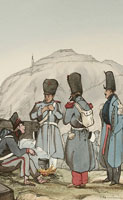 The First Carlist War
The First Carlist WarSell-off and annihilation of the Foreign Legion.
Much has been written about the performance of the Foreign Legion in the First Carlist War in Spain and some authors have spared no effort in glorifying it as truly heroic. But the writings of historian Douglas Porch and the memoirs of those involved draw quite a different picture.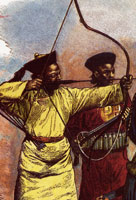 The Taiping Rebellion
The Taiping Rebellionand the formation of the Ever Victorious Army.
If western history books even mention the great war which devastated China in the mid-19th Century at all, it's euphemistically referred to as the "Taiping Rebellion". It was probably the bloodiest war that had afflicted humanity in its history before the 20th Century and it's estimated that the Taiping Rebellion cost the lives of 15-20 million people and left more than half of the country's one thousand prospering cities in charred ruins.The 20th Century
 Apocalypse Now
Apocalypse NowThe man who was "Colonel Kurtz".
In Francis Ford Coppola's film "Apocalypse Now", the CIA sent Captain Willard far over the border from Vietnam to secretly dispatch a highly decorated Special Forces officer who had gone mad. The role that Joseph Conrad's "Heart of Darkness" played in the creation of this Colonel Kurtz is well known, but there are other, more recent references too. The real reason for transplanting the mad Kurtz from the Congo to the no-man's land beyond Vietnam can be found in the CIA's covert operations in Laos and Cambodia. The Islamic Legion
The Islamic LegionGaddafi's former Mercenaries.
There has been much talk recently of Gaddafi's mercenaries. False reports have mingled with rumours and half truths, and yet it is certain that such fighters are used, and that most of them come from sub-Saharan Africa. Occasionally there are also references to the Islamic Legion, a Libyan mercenary unit, which was in action between 1972 and 1987 but little noticed by the world. Given recent events it may be worthwhile to examine its short history more closely...Present-Day
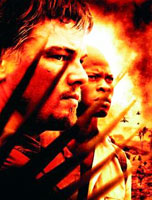 War for Diamonds
War for DiamondsExecutive Outcomes in Sierra Leone.
Many people who saw the movie "Blood Diamond" learned for the first time something about the terrible war in Sierra Leone and the trade in blood diamonds, but they were also confronted with a completely new type of mercenaries represented by a group which, if you hadn't already heard of them, you would soon be reading about in the reviews: Executive Outcomes.General
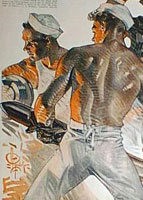 Homosexuality
Homosexuality